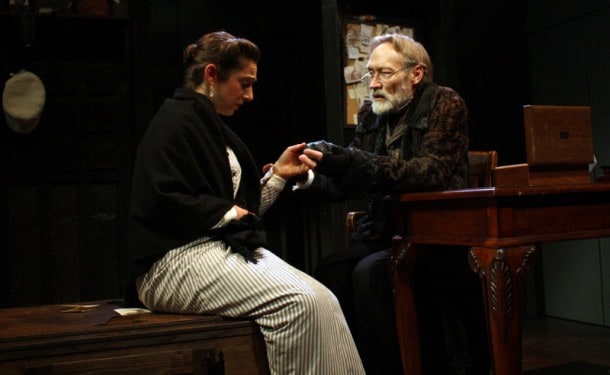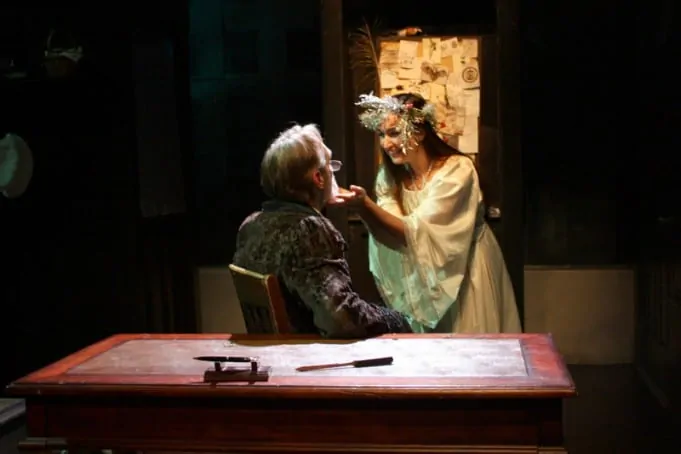Swedish novelist and playwright August Strindberg exercised enormous influence over modern theatre – and the centennial celebration of his death is in full swing at the Cutting Ball Theater. Founder Rob Melrose has focused on works written by Strindberg near the end of his life. “Ghost Sonata” plays through November 18th. “The Pelican” and “The Black Glove” opened over the weekend. “Storm” and “Burned House” will be opening next week. If you missed any part of this, don’t worry – November 10th, 11th, 17th, and 18th are devoted to Strindberg marathons, during which all five shows will be performed.
Both of the plays that opened last night were dark pieces. With respect to “The Pelican,” Rob Melrose astutely writes that in many ways, it is “the modern chamber version of Hamlet and Electra – a father murdered by the mother and her lover and the children needing to know where their loyalties lie and what revenge to take.” However, unlike Hamlet, the central figure of this fast-paced drama is the evil mother (Danielle O’Hare), who is loosely modeled after Strindberg’s first wife. Her adult children attempt to come to terms with their realization that their mother unnecessarily starved them, killed their father, and covered her tracks with a passel of lies. Her lush red dress, which provided the only color on otherwise dark stage, had echoes of the Cindy Sherman painting of Salome.

The only catch here was the portrayal of the mother. Hers was a difficult story arc, beginning as a turn-of-the-century Leona Helmsley, and ending as a suicide when she realizes what she has done. This performance seemed to lack authenticity; rather than evil, the character seemed to suffer from in extremis pettiness, which didn’t establish the motivation for her suicide. Better were the three Testing Powers. Dressed in servants’ clothes, these ghosts remained seated onstage throughout the action, reacting to the drama, and arising unseen to create mischief onstage. Watching their reactions was the best part of the show.
[ALSO: August Strindberg and the Swedish Culture Amnesia]
“The Black Glove” was not as fast-paced as “The Pelican.” Although program notes claim that this is the most cheerful and redemptive of the five chamber plays, its focus on a missing infant presumed to be dead, and a dying old man who realizes his life has been misspent are hardly uplifting. My response isn’t entirely related to this particular production. Perhaps there should be a moratorium this month on plays involving slain or kidnapped children. The horrific moment in which the wife of CBS exec Kevin Krim found her slain children in Manhattan earlier this week is still fresh in our minds. Using the disappearance of a child to teach some kind of moral lesson or whatever Strindberg was trying to achieve only seems grossly self-serving. That said, David Sinaiko’a masterful performance as Yule-Tomte goes a long way toward redeeming this work.
Despite these criticisms, we’re lucky to have the Cutting Ball take the Strindberg centennial so seriously. The deliberation required by this one-of-a-kind undertaking is clearly a labor of love. More information about Strindberg and centennial events can be found at strindberg.cuttingball.



